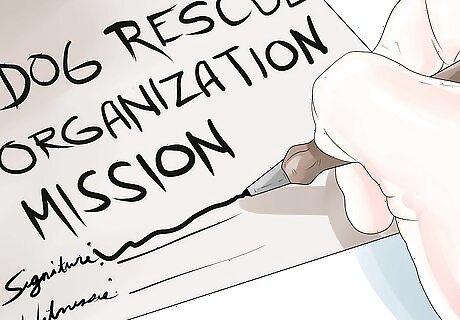
views

Explore your motivations for wanting to start a dog rescue to be sure it's something you really want to do. Rescuing dogs can be quite rewarding. However, starting your own dog rescue organization will also be expensive, time consuming and often emotionally draining when you become aware of the countless numbers of dogs in need. Start by talking to the staff of pounds, shelters and animal control organizations in your area to get an idea about the numbers of dogs and their needs.

Study the area in which you live to learn about the population of homeless dogs before you start a dog rescue.

Determine how much support you might get in your area for your dog rescue organization. Local veterinarians, dog trainers and pet sitters are good contacts to start with to get an idea how receptive your area might be to a dog rescue organization. These contacts also might give you leads to obtaining a network of helpers and volunteers. Those who work in the business can advise you from first-hand experience about the problems and pit falls of dog rescue.

Interview the volunteers at other dog shelters and rescue organizations to learn from those with experience what starting dog rescues is like.

Organize a group of people who are willing to do various volunteer activities to help with your dog rescue organization. This is vital, because dog rescuers have many tasks to meet the needs of the dogs. These include fundraising, transporting, fostering, feeding, walking and providing basic dog care. Both have options have pros and cons. Fosters must be ready to deal with all of the issues that can arise from keeping dogs in their homes. If you have the money it takes to build a shelter, it must meet specific codes and pass certain government inspections. Many dog rescues rely on loving foster families to temporarily house homeless dogs, while others build a kennel-type facility.

Decide where you want run your dog rescue organization, whether it includes using temporary foster homes to house the dogs or building a shelter.

Prepare all of the necessary paperwork including a mission statement outlining the mission of your dog rescue organization to get ready to file for tax exempt or 501 (c) 3 status.

Hire a professional, either an attorney or accountant, to file for your tax exempt status. This is difficult to do without professional assistance. In addition, 501 (c) 3 tax exempt status protects you and your organization and allows you to raise charitable funds to pay for your needs. Having enough money on hand to support your dog rescue efforts is key to making sure the dogs' needs are met and that your dog rescue stays fiscally sound.

Raise funds to support your dog rescue efforts by holding a variety of fundraisers and by applying for grants.




















Comments
0 comment